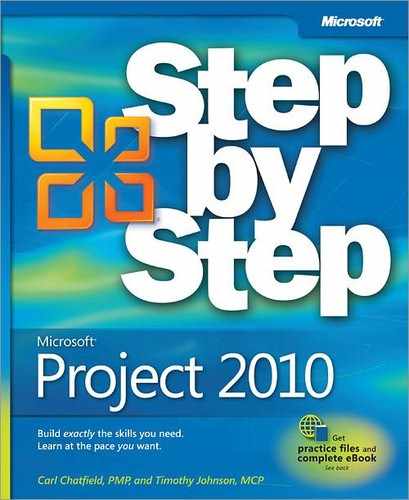Appendix B. Roadmap for Developing Your Project and Project Management Skills
If you’ve completed most of or all the chapters in this book, you’re well on your way to mastering Microsoft Project 2010. However, one book can get you only so far. To help further your knowledge of Project and project management, start with these sources.
Joining a Project Learning Community
If there’s one thing we can say about Project users, it’s that they love to talk about the program and their work with it and to share ideas with others. Whether you work in a large organization or independently, you’re likely to find a community of Project users nearby.
If you’re in a large organization, especially one with a strong project management focus, you might find an internal Project user group or support group there. Such groups often meet informally to provide peer training and support, critique project plans, and share best practices. If such a group does not exist in your organization, perhaps you can start one.
In the public realm, there are many Project user groups around the world. These groups typically meet on a regular basis to share tips and tricks about Project. Joining a user group is a great way to broaden your exposure to Project usage; it also can be a great source for informal product support, training, and career networking.
The following are a few places where you can investigate Project user groups and related resources:
The Microsoft Project User Group (MPUG) is the official industry association for Project. MPUG offers information about a variety of Project and project management resources, as well as a directory of Project user groups around the world. Find it on the Web at www.mpug.com.
The Project area of the Microsoft Office Online website includes a variety of tools and information from Microsoft and other Project users to help you manage your projects. Find it on the Web at http://office.com, and then navigate to the Project page.
The official Project newsgroup offers help and discussions with other Project users, including Microsoft Most Valuable Professionals (MVPs). To get started, see the following websites:
http://www.microsoft.com/office/community/en-us/default.mspx
The Microsoft Project MVPs are independent Project experts (not Microsoft employees) officially given MVP status by Microsoft in recognition of their product expertise and work in helping the larger user community use Project successfully. MVPs frequently respond to questions in the newsgroups. Find Project MVP information at https://mvp.support.microsoft.com/communities/mvp.aspx, and then navigate to the Project page.
The Enterprise Project Management (EPM) areas of the Microsoft Office Online website includes evaluation, deployment, and IT administration information for the Microsoft EPM solutions. Find them on the Web at http://office.com, and then navigate to the Project Server page.
One of the authors of this book, Carl Chatfield, posts to a blog that focuses on Project, project management, and knowledge worker teams. Find the blog on the Web at http://www.projhugger.com.
To showcase your Project expertise formally, you can become certified. Microsoft developed Microsoft Certified Technology Specialist (MCTS) certifications for Project and enterprise project management solutions for Project 2007, and may offer similar certifications for Project 2010. To learn about training opportunities and requirements for Project certification, look on the Web at www.microsoft.com/learning.
Joining a Project Management Learning Community
Perhaps more than other desktop programs, Project requires you to be involved in a specific formal activity: project management. Project management can be an exciting mix of technical, organizational, and social challenges. The Project Management Institute (PMI) is the leading organization of professional project management. PMI focuses on setting project management standards, developing and offering educational programs, and certifying project managers. The most widely recognized PMI certification is the Project Management Professional (PMP) certification.
A Guide to the Project Management Body of Knowledge—published by the PMI and referred to as the PMBOK (pronounced “pimbok”) describes generally accepted project management practices, knowledge areas, and terminology. In addition, the PMI publishes the journals Project Management Journal and PM Network. You can learn more about the PMI on the Web at www.pmi.org. If you are professionally invested in the practice of project management, you should be in the PMI.
Final Words
There are, of course, many worthwhile commercial and nonprofit organizations dedicated to Project and project management besides those we have described here. Project enjoys a leading position in the diverse, sometimes contentious, but always interesting world of project management. Wherever you are in your own Project and project management knowledge and career development, you can find a great variety of supporting organizations and peers today. The authors wish you the greatest success!
